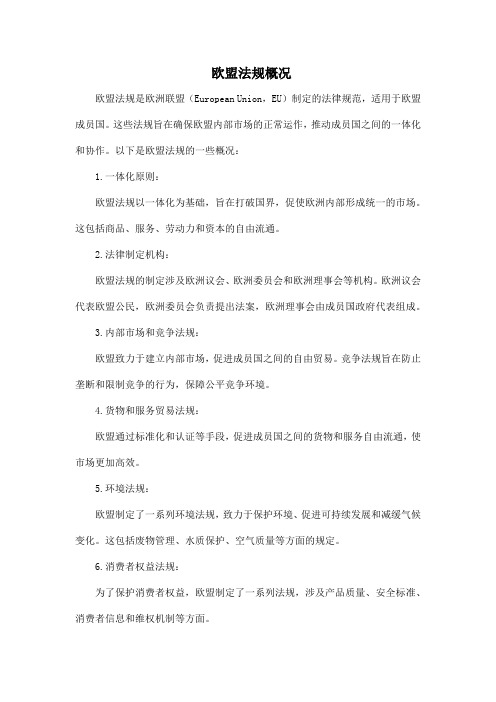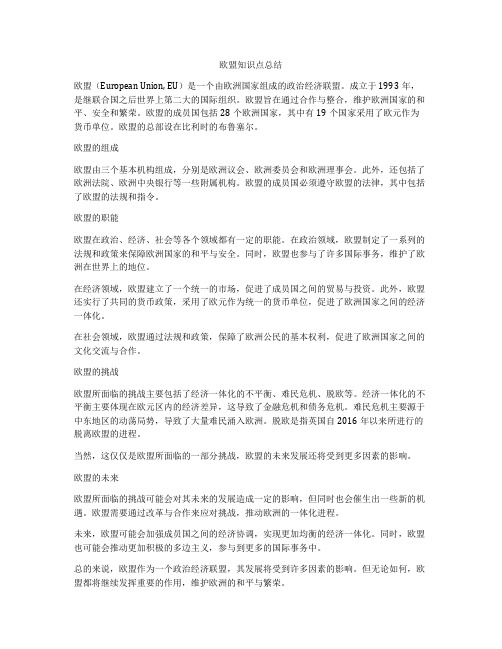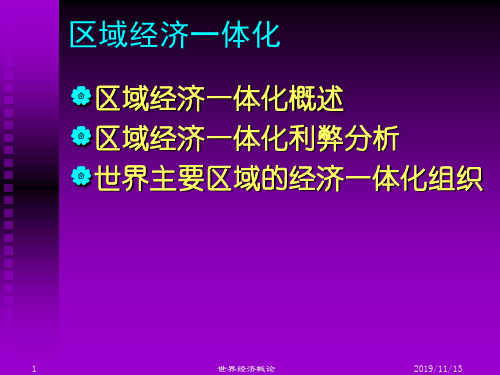European union competition law
欧盟法规概况

欧盟法规概况欧盟法规是欧洲联盟(European Union,EU)制定的法律规范,适用于欧盟成员国。
这些法规旨在确保欧盟内部市场的正常运作,推动成员国之间的一体化和协作。
以下是欧盟法规的一些概况:1.一体化原则:欧盟法规以一体化为基础,旨在打破国界,促使欧洲内部形成统一的市场。
这包括商品、服务、劳动力和资本的自由流通。
2.法律制定机构:欧盟法规的制定涉及欧洲议会、欧洲委员会和欧洲理事会等机构。
欧洲议会代表欧盟公民,欧洲委员会负责提出法案,欧洲理事会由成员国政府代表组成。
3.内部市场和竞争法规:欧盟致力于建立内部市场,促进成员国之间的自由贸易。
竞争法规旨在防止垄断和限制竞争的行为,保障公平竞争环境。
4.货物和服务贸易法规:欧盟通过标准化和认证等手段,促进成员国之间的货物和服务自由流通,使市场更加高效。
5.环境法规:欧盟制定了一系列环境法规,致力于保护环境、促进可持续发展和减缓气候变化。
这包括废物管理、水质保护、空气质量等方面的规定。
6.消费者权益法规:为了保护消费者权益,欧盟制定了一系列法规,涉及产品质量、安全标准、消费者信息和维权机制等方面。
7.数字市场法规:针对数字经济的快速发展,欧盟推出了一系列法规,涉及数据保护、电子商务、数字版权等领域。
8.移民和边境控制法规:欧盟通过一体化的移民和边境控制政策,努力协调成员国之间的移民和庇护事务。
9.货币和财政政策:欧元是欧盟的官方货币,欧洲央行负责欧元的货币政策。
欧盟还通过财政政策协调成员国的经济政策。
10.外交和安全政策:尽管欧盟的外交和安全政策主要由成员国负责,但欧盟也在一些领域展开合作,以促进共同安全和国际合作。
这些法规构成了欧盟的法律框架,对成员国的法律体系产生深远影响。
需要注意的是,欧盟法规的适用范围和权威性可能因法规性质而异。
欧盟1419-2006法律 关于废除班轮公会反垄断豁免权的文件

I(Acts whose publication is obligatory)COUNCIL REGULATION(EC)No1419/2006of25September2006repealing Regulation(EEC)No4056/86laying down detailed rules for the application of Articles85 and86of the Treaty to maritime transport,and amending Regulation(EC)No1/2003as regards the extension of its scope to include cabotage and international tramp services(Text with EEA relevance)THE COUNCIL OF THE EUROPEAN UNION,Having regard to the Treaty establishing the European Community,and in particular Article83thereof,Having regard to the proposal from the Commission, Having regard to the opinion of the European Parliament(1),Having regard to the opinion of the European Economic and Social Committee(2),After consulting the Committee of the Regions, Whereas:(1)Application of the rules on competition in the maritimetransport sector has been subject to the provisions ofRegulation(EEC)No4056/86(3)since1987.Regulation(EEC)No4056/86originally had two functions.Firstly,itcontained procedural provisions for the enforcement ofCommunity competition rules in the maritime transportsector.Secondly,it laid down certain specific substantivecompetition provisions for the maritime sector andnotably a block exemption for liner shippingconferences,allowing them to fix prices and regulatecapacity under certain conditions,the exclusion ofpurely technical agreements from the application ofArticle81(1)of the Treaty and a procedure for dealingwith conflicts of international law.It did not apply tomaritime transport services between ports in one or tothe same Member State(cabotage)and internationaltramp vessel services.(2)Council Regulation(EC)No1/2003of16December2002on the implementation of the rules on competitionlaid down in Articles81and82of the Treaty(4)amended Regulation(EEC)No4056/86to bringmaritime transport under the common competitionenforcement rules applicable to all sectors with effectfrom1May2004,with the exception of cabotage andinternational tramp vessel services.However,the specificsubstantive competition provisions relating to themaritime sector continue to fall within the scope ofRegulation(EEC)No4056/86.(3)The liner shipping conference block exemption providedfor in Regulation(EEC)No4056/86exempts from theprohibition of Article81(1)of the Treaty agreements,decisions and concerted practices of all or part of themembers of one or more liner conferences which fulfilcertain conditions.The justification for the blockexemption in essence assumes that conferences bringstability,ensuring exporters reliable services whichcannot be achieved by less restrictive means.However,a thorough review of the industry carried out by theCommission has demonstrated that liner shipping isnot unique as its cost structure does not differ substan-tially from that of other industries.There is therefore noevidence that the industry needs to be protected fromcompetition.EN28.9.2006Official Journal of the European Union L269/1(1)Opinion of4July2006(not yet published in the Official Journal).(2)Opinion delivered on5July2006(not yet published in the OfficialJournal).(3)OJ L378,31.12.1986,p.4.Regulation as last amended by the2003Act of Accession.(4)OJ L1,4.1.2003,p.1.Regulation as amended by Regulation(EC)No411/2004(OJ L68,6.3.2004,p.1).(4)The first condition for exemption under Article81(3)requires that the restrictive agreement contributes toimproving the production or distribution of goods orto promoting technical or economic progress.Asregards the efficiencies generated by conferences,linerconferences are no longer able to enforce the conferencetariff although they still manage to set charges andsurcharges which are a part of the price of transport.There is also no evidence that the conference systemleads to more stable freight rates or more reliableshipping services than would be the case in a fullycompetitive market.Conference members increasinglyoffer their services via individual service agreementsentered into with individual exporters.In addition,conferences do not manage the carrying capacity thatis available as this is an individual decision taken byeach carrier.Under current market conditions pricestability and the reliability of services are brought aboutby individual service agreements.The alleged causal linkbetween the restrictions(price fixing and supply regu-lation)and the claimed efficiencies(reliable services)therefore appears too tenuous to meet the firstcondition of Article81(3).(5)The second condition for exemption under Article81(3)is that consumers must be compensated for the negativeeffects resulting from the restriction of competition.Inthe case of hard core restrictions,such as horizontal pricefixing which occur when the conference tariff is set andcharges and surcharges are jointly fixed,the negativeeffects are very serious.However no clearly positiveeffects have been identified.Transport users considerthat conferences operate for the benefit of the leastefficient members and call for their abolishment.Conferences no longer fulfil the second condition ofArticle81(3).(6)The third condition for exemption under Article81(3)isthat the conduct must not impose on the undertakingsconcerned restrictions which are not indispensable to theattainment of its objectives.Consortia are cooperativeagreements between liner shipping lines that do notinvolve price fixing and are therefore less restrictivethan conferences.Transport users consider them toprovide adequate,reliable and efficient scheduledmaritime services.In addition the use of individualservice agreements has increased significantly in recentyears.By definition,such individual service agreementsdo not restrict competition and provide benefits toexporters as they make it possible to tailor specialservices.Furthermore,because the price is established inadvance and does not fluctuate for a predeterminedperiod(usually up to one year),service contracts cancontribute to price stability.It has therefore not beenestablished that the restrictions of competitionpermitted under Regulation(EEC)No4056/86(pricefixing and capacity regulation)are indispensable for theprovision of reliable shipping services to transport usersas these can be achieved by less restrictive means.Thethird condition under Article81(3)is therefore notsatisfied.(7)Finally,the fourth condition under Article81(3)requiresthat the conference should remain subject to effectivecompetitive constraints.In current market circumstancesconferences are present in nearly all major trade lanesand they compete with carriers grouped in consortia andwith independent lines.Whilst there may be pricecompetition on the ocean freight rate due to theweakening of the conference system there is hardly anyprice competition with respect to the surcharges andancillary charges.These are set by the conference andthe same level of charges is often applied by non-conference carriers.In addition,carriers participate inconferences and consortia on the same trade,exchangingcommercially sensitive information and cumulating thebenefits of the conference(price fixing and capacity regu-lation)and of the consortia(operational cooperation forthe provision of a joint service)block exemptions.Giventhe increasing number of links between carriers in thesame trade,determining the extent to which conferencesare subject to effective internal and external competitionis a very complex exercise and one that can only be doneon a case by case basis.(8)Liner shipping conferences therefore no longer fulfil thefour cumulative conditions for exemption under Article81(3)of the Treaty and the block exemption in respectof such conferences should therefore be abolished.(9)The exclusion from the prohibition of Article81(1)ofthe Treaty of purely technical agreements and theprocedure for dealing with conflicts of law which mayarise are also redundant.Those provisions shouldtherefore also be deleted.(10)In the light of the above,Regulation(EEC)No4056/86should be repealed in its entirety.ENL269/2Official Journal of the European Union28.9.2006(11)Liner conferences are tolerated in several jurisdictions.In this,as in other sectors,competition law is not applied in the same way worldwide.In light of the global nature of the liner shipping industry,the Commission should take the appropriate steps to advance the removal of the price fixing exemption for liner conferences that exist elsewhere whilst maintaining the exemption for opera-tional cooperation between shipping lines grouped in consortia and alliances,in line with the recommendations of the OECD Secretariat in 2002.(12)Cabotage and international tramp vessel services have been excluded from the rules implementing Articles 81and 82of the Treaty originally laid down in Regulation (EEC)No 4056/86and subsequently in Regulation (EC)No 1/2003.They are currently the only remaining sectors to be excluded from the Community competition implementing rules.The lack of effective enforcement powers for these sectors is an anomaly from a regulatory point of view.(13)The exclusion of tramp vessel services from Regulation (EC)No 1/2003was based on the fact that rates for these services are freely negotiated on a case by case basis in accordance with supply and demand conditions.However,such market conditions are present in other sectors and the substantive provisions of Articles 81and 82already apply to these services.No convincing reason has been brought forward to maintain the current exclusion of these services from the rules implementing Articles 81and 82of the Treaty.Similarly,although cabotage services often have no effect on intra Community trade,this does not mean that they should be excluded from the scope of Regulation (EC)No 1/2003from the outset.(14)As the mechanisms enshrined in Regulation (EC)No 1/2003are appropriate for applying the competitionrules to all sectors,the scope of that Regulation should be amended so as to include cabotage and tramp vessel services.(15)Regulation (EC)No 1/2003should therefore be amended accordingly.(16)Since Member States may need to adjust their interna-tional commitments in the light of the abolition of the conference system,the provisions of Regulation (EEC)No 4056/86relating to the liner conference block exemption should continue to apply to conferences satisfying the requirements of Regulation (EEC)No 4056/86on the date of entry into force of this Regu-lation for a transitional period,HAS ADOPTED THIS REGULATION:Article 1Regulation (EEC)No 4056/86shall be repealed.However,Article 1(3)(b)and (c),Articles 3to 7,Article 8(2)and Article 26of Regulation (EEC)No 4056/86shall continue to apply in respect of liner shipping conferences satisfying the requirements of Regulation (EEC)No 4056/86on 18October 2006,for a transitional period of two years from that date.Article 2Article 32of Regulation (EC)No 1/2003shall be deleted.Article 3This Regulation shall enter into force on the 20th day following its publication in the Official Journal of the European Union .This Regulation shall be binding in its entirety and directly applicable in all Member States.Done at Brussels,25September 2006.For the Council The PresidentM.PEKKARINENEN28.9.2006Official Journal of the European Union L 269/3。
欧盟知识点总结

欧盟知识点总结欧盟(European Union, EU)是一个由欧洲国家组成的政治经济联盟。
成立于1993年,是继联合国之后世界上第二大的国际组织。
欧盟旨在通过合作与整合,维护欧洲国家的和平、安全和繁荣。
欧盟的成员国包括28个欧洲国家,其中有19个国家采用了欧元作为货币单位。
欧盟的总部设在比利时的布鲁塞尔。
欧盟的组成欧盟由三个基本机构组成,分别是欧洲议会、欧洲委员会和欧洲理事会。
此外,还包括了欧洲法院、欧洲中央银行等一些附属机构。
欧盟的成员国必须遵守欧盟的法律,其中包括了欧盟的法规和指令。
欧盟的职能欧盟在政治、经济、社会等各个领域都有一定的职能。
在政治领域,欧盟制定了一系列的法规和政策来保障欧洲国家的和平与安全。
同时,欧盟也参与了许多国际事务,维护了欧洲在世界上的地位。
在经济领域,欧盟建立了一个统一的市场,促进了成员国之间的贸易与投资。
此外,欧盟还实行了共同的货币政策,采用了欧元作为统一的货币单位,促进了欧洲国家之间的经济一体化。
在社会领域,欧盟通过法规和政策,保障了欧洲公民的基本权利,促进了欧洲国家之间的文化交流与合作。
欧盟的挑战欧盟所面临的挑战主要包括了经济一体化的不平衡、难民危机、脱欧等。
经济一体化的不平衡主要体现在欧元区内的经济差异,这导致了金融危机和债务危机。
难民危机主要源于中东地区的动荡局势,导致了大量难民涌入欧洲。
脱欧是指英国自2016年以来所进行的脱离欧盟的进程。
当然,这仅仅是欧盟所面临的一部分挑战,欧盟的未来发展还将受到更多因素的影响。
欧盟的未来欧盟所面临的挑战可能会对其未来的发展造成一定的影响,但同时也会催生出一些新的机遇。
欧盟需要通过改革与合作来应对挑战,推动欧洲的一体化进程。
未来,欧盟可能会加强成员国之间的经济协调,实现更加均衡的经济一体化。
同时,欧盟也可能会推动更加积极的多边主义,参与到更多的国际事务中。
总的来说,欧盟作为一个政治经济联盟,其发展将受到许多因素的影响。
国际商法专业词汇中英文对照表

国际商法专业词汇中英文对照ANoteontheIncoterms(国际贸易术语通则解释)AbsoluteAdvantage(亚当.斯密的绝对优势理论)? AcceptancewithModifications(对邀约做出修改、变更的承诺)Acceptance(承诺/受盘)ActofStateDoctrine(国家行为主义)ActoftheParties(当事人的行为)AdministrativeManagement(经营管理)AdvisingandConfirmingLettersofCredit(信用证的通知和确认)AgentforInternationalSettlements(国际结算代理人)AgreementoftheParties(协议选择原则)Agriculture(农业协定)AlternativeDisputeResolution(ADR解决方式)AnticipatoryBreachinCommonLaw(普通法上预期违约)AntidumpingAuthority(反倾销机构)ApplicabilityoftheCISG?(CISG的适用范围) ApplicationofHomeStateLaborLawsExtraterritorially(内国劳工法律域外适用)ApplyingforaLetterofCredit(信用证的申请)ApprovalofForeignInvestmentApplications(外国投资申请的批准)Arbitrage(套汇)ArbitrationAgreementandArbitrationClauses(仲裁协议和合同中的仲裁条款)ArbitrationTribunals(仲裁机构)ArtisticPropertyAgreements(保护文学艺术作品的协定)ArtisticPropertyAgreements(文学艺术品产权协定)Assignment(合同权利转让)Attorney-General(法律总顾问)AutomaticDissolution(自动散伙)AverageClauses(海损条款)Avoidance(解除)BankDeposits(银行储蓄)BasesofIncomeTaxation(所得税的征税依据/基础)BattleoftheForms(形式上的分歧/冲突)BillsofLading?(提单)BranchBanking(银行的分支机构)BusinessFormandRegisteredCapital(企业形式和注册资本)BusinessForms(商业组织形式)Buyer'sRemedies(买方可以采取的救济措施)CarriageofGoodsbyAir(航空货物运输)CarriageofGoodsbySeaandMarineCargoInsurance(海上货物运输及其保险)Carrier'sDutiesunderaBillofLading(在提单运输方式下承运人的责任/义务)Carrier'sImmunities(承运人责任/义务的豁免)Cartels(企业联合/卡特尔) CategoriesofInvestmentProjects(外国投资的项目类别)Charterparties(租船合同)CharterpartiesbyDemise(光船出租合同)China's FundamentalPoliciesforEncouragingForeignInvestments (中国大陆鼓励外国投资的基本政策)ChoosingtheGoverningLaw(准据法的选择)CIF(cost,insuranceandfreight)(portofdestination)(CIF成本\保险费加运费付至指定的目的港)CivilLaw(民法法系) ClearanceandSettlementProcedures(交换和转让程序)CollectionofDocumentaryBillsThroughBanks(银行跟单托收)CommercialArbitration(国际商事仲裁)CommodityArrangements(初级产品/农产品安排)CommonEnterpriseLiability(企业的一般责任)CommonLaw(普通法系)CommonProceduresinHandlingBillsofExchange(汇票处理的一般程序)CommonStock(股票)CompanyTaxpayers(公司/法人企业纳税人)ComparativeAdvantage(大卫.李嘉图的比较优势理论) ComparisonofMunicipalLegalSystems(内国法系的比较研究) CompensationforWindingup(清算补偿)ComprehensiveAgreements(综合性的协定)CompulsoryLicenses(强制许可)ComputationofIncome(收入计算)ConformityofGoods(与合同约定相符合的货物)ConsenttotheJurisdictionoftheHostState(给予东道国管辖权的许可/同意)ConsiderationinCommonLaw(英美法上的对价)ContemporaryInternationalTradeLaw(当代国际贸易法)ContractLawfortheInternationalSaleofGoods(国际货物销售合同法)ContractLiabilityoftheAgent(代理人的合同义务)ContractLiabilityofthePrincipal(委托人的合同义务)ContractualIssuesExcludedfromtheCoverageofCISG(排除在CISG适用范围之外的合同问题)Copyrights(着作权/版权)CouncilforTrade-RelatedAspectsofIntellectualPropertyR ights(与知识产权有关的理事会)CoverageofTaxTreaties(税收条约的覆盖范围)CreationofAgency(代理创立)CreditorsofPartners(合伙人的债权人)CurrencyCrises:TheRoleofMonetaryPolicy(金融危机:货币政策的作用与地位)CurrencyExchangeObligationsofIMFMemberStates(国际货币基金组织成员国在外汇交易中的义务)CurrencyExchange(外汇交易)CurrencySupport(资金/财政援助)Custom(习惯)CustomsValuation(海关估价协定)DebtSecurities(债券)DecisionMakingwithintheWTO(WTO内部决定作出机制)DeficienciesintheGATT1947DisputeProcess(关税及贸易总协定1947争端解决程序的不足)DefiniteSumofMoneyorMonetaryUnitofAccount(确定货币的总额或者计价的货币单位)DefinitionandSpecialFeatures(定义和特征)DelayedBillsofLading(提单迟延)DenialofJustice(司法不公)DevelopmentBanks(发展银行)DirectEffect(直接效力)DirectExporting(直接出口)Directors'andOfficer'sDutiestotheCorporation(董事和经理/首席执行官对公司的义务)DisputeSettlement(争端的解决)DissolutionbyAgreement?(协议解散)DissolutionbyCourtOrder(依法院令状散伙)DissolutionofthePartnership(散伙)DistributionofEarningsandRecoveryofInvestments?(收入分配和投资回收)DistributiontoShareholders(红利分配权)DoctrineofImputability(归责原则) DocumentaryFormalities(文本格式要求)DoubleTaxationProvision(双重征税的规定)DoubleTaxation(双重征税)Duress(胁迫行为)DutiesofAgentandPrincipal(代理人和委托人的义务)DutiesofAgenttoPrincipal(委托人的义务)DutiesofPrincipaltoAgent(代理人、的义务)DutyofCareinPartnershipBusiness(对合伙事务尽心看护义务)DutyofLoyaltyandGoodFaith(忠诚和诚信义务)EffectivenessofanOffer(邀约/发盘的效力)EmploymentLawsintheEuropeanUnion(欧洲联盟雇佣/劳工法)EmploymentStandardsoftheOrganizationforEconomicCooper ationandDevelopment(经济合作与发展组织雇佣/劳工标准)EnforcementofExchangeControlRegulationsofIMFMemberSta tes(国际货币基金组织成员国对外汇交易管理规则的履行)EnforcementofForeignArbitralAwardsinthePeople'sRepubl icofChina(在中华人民共和国境内外国仲裁裁决的执行)EnforcementofForeignJudgment(外国法院判决的执行)EnforcementofPartnershipRightsandLiabilities(执行合伙事务的权利和责任)EnforcementofSecuritiesRegulationsInternationally(国际证券规则的执行)EnvironmentalRegulation(环境规则)EscapeClause(免责条款)Euro-currencyDeposits(欧洲货币储蓄)EuropeanCommunities-RegimefortheImportation,Sale,andD istributionofBananas(欧洲共同体对于香蕉的进口、销售和分销的管理)EuropeanUnionLawonTradeinServices(欧洲联盟关于服务贸易的法律)ExceptiononAdimpletiContractusinCivilLaw(大陆法上履行契约之抗辩权)Exceptions(例外)ExclusiveLicenses(独占许可)ExcusesforNon-performance(不履行的免责)ExcusesforNonperformance(不履行合同的抗辩/借口)ExemptionsforNewMembersfromIMFMemberStateCurrencyExch angeObligations(国际货币基金组织新成员国在外汇交易中义务的免除)ExportRestrictions(出口限制)Exporting(出口)Expropriation(征收)ExtraterritorialApplicationofU. S.SecuritiesLaws(美国证券法域外的适用问题)FailuretoExhaustremedies(没有用尽法律救济)FaultandCausation(过错和因果关系)FinanceMinistry(财政部)FinanceofInternationalTrade(国际贸易的结算/支付) FinancingForeignTrade(对外贸易的价金支付)FOB(freeonhoard)(portofshipment)(FOB装运港船上交货)ForceMajeureClauses(不可抗力条款)ForeignInvestmentGuarantees(外国投资的担保)ForeignInvestmentLawsandCodes(外国投资法)FormalandInformalApplicationProcess(正式和非正式申请程序)FormationoftheContract(合同的成立)ForsedEndorsements(虚假背书)FraudExceptioninLettersofCreditTransaction(信用证交易的欺诈例外)FraudsonBillsofLading(提单欺诈)FraudulentMisrepresentation(受欺诈的误解)FreeZones(保税区/自由贸易区)FundamentalBreach(根本违约)GATSSchedulesofSpecificCommitments(服务贸易总协定减让表中的特别承诺)? GeneralAgreementonTradeinServices(服务贸易总协定) GeneralRequirementsandRightsoftheHolderinDueCourse(票据持有人的一般要求和权利)GeneralStandardsofPerformance(履行的一般标准)GeographicLimitations(地区限制)GovernmentControlsoverTrade(政府对贸易的管制) GovernmentGuarantees(政府担保)GovernmentalInterest(政府利益原则)GovernmentalSourcesofCapital(官方资金)GrantBackProvisions(回授的规定)HomestateRegulationofMultinationalEnterprises(本国对跨国企业的管理)HostStateRegulationofMultinationalEnterprises(东道国对跨国企业的管理)IllegalityandIncompetency(行为不合法性与主体不适当资格的认定)IMF"Conditionality"(国际货币基金组织的制约性) IMFFacilities(国际货币基金组织的机制)IMFOperations(国际货币基金组织的运作)IMFQuotas(国际货币基金的份额)ImmunitiesofStatesfromtheJurisdictionofMunicipalCourt s(国家豁免于内国法院的管辖权)Import-LicensingProcedures(进口许可证程序协定)IncomeCategories(收入分类)IncomeTaxRates(所得税税率)IncomeTaxes(所得税)IndependencePrinciplesandRuleofStrictCompliance(信用证独立原则和单证严格相符规则)IndirectExporting(间接出口) IndustrialPropertyAgreements(保护工业产权的协定)InnocentMisrepresentation(因无知的误解)Inquiry(调查)InsiderTradingRegulations(内幕交易规则)InsuranceCover(保险范围)IntegrationofCompanyandPersonalIncomeTaxes(公司和个人所得税的征收)IntellectualPropertyRightLaw(知识产权法)InternationalCenterfortheSettlementofInvestmentDisput es(解决投资争端国际中心)InternationalCommercialDisputeSettlement(国际商事争端的解决)?InternationalCourtofJustice(海牙联合国国际法院)InternationalFactoring(国际保理)InternationalFranchising(国际特许经营权)? InternationalLaborStandards(国际劳工标准)InternationalLicensingAgreement(国际许可证协议) InternationalLicensingAgreements(国际许可证协定)InternationalModelLaw(国际示范法) InternationalOrganizations(国际组织) InternationalPersons(国际法主体)InternationalRulesfortheInterpretationofTradeTerms(国际贸易术语解释通则) InternationalTradeCustomsandUsages(国际贸易惯例和习惯)InternationalTreatiesandConventions(国际条约和公约) InternationalTribunals(国际法庭)InterpretingoftheCISG(CISG的解释)InvitationOffer(要约邀请/要约引诱/询盘)InvoluntaryDissolution(非自愿解散)IssuanceofSecurities(证券发行)JurisdictionandVenue(管辖权和法院地)JurisdictioninCivilCases(民事案件的管辖权)JurisdictioninCriminalCases(刑事案件的管辖权)Know-how(技术秘密/专有技术)LackofGenuineLink(缺乏真实的联系)LackofNationality(无国籍)LackofStanding(身份不明)LawApplicabletoLettersofCredit(调整信用证的法律)LawofForeignInvestmentEnterprisesofChina(中国的外商投资企业法)LawofthePeople'sRepublicofChinaonChineseForeignContra ctualJointVentures(中华人民共和国中外合作企业法)LawofthePeople'sRepublicofChinaonChineseForeignEquity JointVentures?(中华人民共和国中外合资企业法)LawofthePeople'sRepublicofChinaonForeignCapitalEnterp rises(中华人民共和国外资企业法)LegalCharacteristics(定义和法律特征)LegalStructureoftheWTO(世界贸易组织的法律框架)LegalSystemofInternationalBusiness(国际商事的法律体系)LettersofCredit(L/C)(信用证)LiabilitiesofMakers,Drawers,Drawees,EndorsersandAccom modationParties(票据制作人、出票人、付款人、背书人、代发人/担保人的责任)LiabilityforEnvironmentalDamage(环境损害责任)LiabilityLimits(承运人责任/义务的限制)LicensingRegulations(许可证制度)LimitationsonForeignEquity(外国投资的资金比例限制)LimitationsontheExcusesThatDrawersandMakersCanUsetoAv oidPayingOffaBillorNote??661(票据制作人、出票人拒绝付款借口的限制)LiquidatedDamages(约定的损害赔偿金)Liquidation(清算)MaintainingMonetaryValue(维护币值稳定)MajorPrinciplesofGATT1994(关税及贸易总协定1947的主要原则)MarineInsurancePoliciesandCertificates(海运保险单和证书)MaritimeInsurance(海运保险)MaritimeLiens(留置权)MeansofDelivery(根据交付方式)Mediation(调停/调解)Membership(成员)MemorandumsofUnderstanding(谅解备忘录)MethodsofInvestmentContribution(出资方式)Mini-trial(模拟审判方式)MiscellaneousTaxes(混杂的,各种各样的税)Misrepresentation(误解)MixedSales(混合销售)ModificationofForeignInvestmentAgreements(外国投资协议的修改)MoneyandBanking(货币与金融)MonopolyControlAuthority(反垄断机构) MostSignificantRelationship(最密切联系原则)Most-favored-nationTreatment(最惠国待遇原则)MovementofWorkers(劳工流动)MultilateralInvestmentGuarantyPrograms(多边投资担保计划/安排)MultilateralTradeAgreements(多边贸易协定)MultilateralTradeNegotiations(多边贸易谈判)MultinationalEnterprise(跨国企业)MunicipalCourts(国内法院的实践)MunicipalLegalSystems(内国法系)NationalForeignInvestmentPolicies(内国的外国投资政策)NationalInvestmentGuaranteePrograms(内国/国家投资担保计划/安排)NationalLaw(国内法)NationalMonetarySystems(国内金融/货币体系)NationalTreatment(国民待遇原则)NationalityPrinciple(国籍原则)Negligent(innocent)Misrepresentation(因疏忽的误解)NegotiabilityofBillsandNegotiabilityofNotes(可流通的汇票和可流通的本票)Negotiation(谈判,议付)NoncompetitionClauses(限制竞争条款)Nondiscrimination(非歧视原则)NonimputableActs(免责行为)NontariffBarrierstoTrade(非关税贸易壁垒) NonwrongfulDissolution(非不法原因散伙)Objections(异议)ObligationsoftheParties(当事人各方的义务)ObligationsoftheSellerandtheBuyer(买卖双方的合同义务)Offer(要约/发盘)OperationofLaw(法律的原因而终止)OperationalReviews(营业审查)?OptingInandOut(加入和退出)OrganizationoftheIMF(国际货币基金组织的机构)OrganizationsAffiliatedwiththeUnitedNations(联合国的相关组织)OverseasPrivateInvestmentCorporation(海外私人投资公司的案件)ParentCompany(母公司)PassingofProperty(产权的转移)PassingofRisk(风险的转移)Patents(专利权)PayableonDemandorataDefiniteTime(付款要求或者在指定的付款时间)PaymentofthePrice(支付价款)PenaltiesforNoncompliance(对于不遵守法规的处罚)PerilsandLosses(保险危险和损失)PersonsImmunefromTaxation(个人所得税的免除)PiercingtheCorporateVeil(普通法上揭开公司的面纱/大陆法上公司人格否认原则)PlaceforDelivery(交付的地点)Post-TerminationRelationship(代理终止后的有关问题)PowersduringWindingup(合伙人在清算过程中的权力/权利)PracticesandUsages(交易习惯和商业惯例)Preemption(先买权/优先权)PreshipmentInspection(装运前检验协定)Price-Fixing(定价)PrivateInsurers(私人/商业保险)PrivateSourcesofCapital(私人资金)ProductsLiabilityLaws(产品质量法)PromissoryNotes(本票)PromoterofInternationalMonetaryCooperation(国际金融合作的促进者)Promoters(公司的发起人)ProtectionofNaturalResources(自然资源的保护)ProtectionofSubsidiaries(分支机构的保护制度)ProtectionofWorkers'RightsbytheCouncilofEurope(欧洲理事会关于劳工权利的保护)ProtectionthroughTariffs(关税保护)ProvingForeignLaw(外国法的查明)ProvisionsGoverningTradeinServicesintheNorthAmericanF reeTradeAgreement(北美自由贸易区协定中关于服务贸易的规定)QualityControls(质量控制)QuantityandField-of-UseRestrictions(对数量和使用领域的限制)RecognitionandEnforcementofAwards(仲裁裁决的承认和执行)RecognitionofForeignJudgments(外国裁决的承认)RefusaltoExerciseJurisdiction(拒绝执行管辖权)RegionalandInternationalDevelopmentAgencies(区域性和国际性发展机构)RegionalIntegration(区域联合)RegionalIntergovernmentalRegulationsonLabor(区域性政府间关于劳工的规定)RegionalIntergovernmentalRegulationsonTradeinServices (关于服务贸易的区域性政府间管理规则)RegionalMonetarySystems(区域性金融体系)RegulationofForeignWorkers(外籍员工的的管理规定)RegulationofPollution(防止污染规则)Relief(救济、赔偿)RemediesAvailabletoBothBuyersandSellers(买卖双方都可以采取的救济措施)RemediesforBreachofContract(违反合同的救济)RequestsforSpecificPerformance(要求继续/特定履行)ResidencyPrinciple(居住地原则)RestrictionsonResearchandDevelopment(对技术研究和发展的限制)RestrictionsThatApplyaftertheExpirationofIntellectual PropertyRights(知识产权保护期满后应用的限制)RestrictionsThatApplyaftertheExpirationoftheLicensing Agreement(知识产权使用许可合同期满后应用的限制)RighttoCompensation(主张赔偿的权利)RightsandDuties(权利与义务)RightsandResponsibilitiesofBeneficiaries(收款人/收益人的权利与义务)RightsandResponsibilitiesoftheAccountParty(付款人/信用证帐户申请人的权利与义务)RulesofOrigin(原产地规则)RulesofPrivateInternationalLaw(国际私法规则)Safeguards(保障措施协定)SanitaryandPhytosanitaryMeasures(卫生与植物卫生措施协定)ScopeandCoverageofGATT1947andGATT1994(关税及贸易总协定1947和1994文本的调整范围)ScreeningForeignInvestmentApplications(对外国投资申请的筛选/审查)SectoralLimitations(行业/部门限制)SecuritiesandExchangeCommission(证券交易委员会)SecuritiesExchanges(证券交易所)SecuritiesRegulations(证券规章)Seller'sObligations(卖方的义务)Seller'sRemedies(卖方可以采取的救济措施)SettlementofDisputesbetweenILOMemberStates(国际劳工组织成员国之间争端的解决)SettlementofDisputesbetweenIntergovernmentalOrganizat ionsandTheirEmployees(政府间国际组织与它的雇员之间争端的解决)SettlementofDisputesinInternationalTribunals(在国际法庭解决争端)SettlementofDisputesinMunicipalCourts(内国法院的争端解决途径)SettlementofDisputesthroughDiplomacy(通过外交途径解决争端)SettlementofDisputesthroughMunicipalCourts(通过内国法院解决国际商事争端)Shareholders'InspectionandInformationRights(股东的监督和知情权)Shareholders'Lawsuits(股东的诉权)Shareholders'Meetings(股东会议/大会)Shareholders'RightsandLiabilities(股东的权利和责任)SharpPractices(欺诈行为)SignedbytheMakerorDrawer(票据制作人或者出票人签名)SourcePrinciple(税收发生来源原则)SourcesofCorporateFinancing?(公司资本的来源)SourcesofForeignInvestmentLawofChina(中国外国投资法的渊源)SourcesofInternationalBusinessLaw(国际商法的渊源) SourcesofInternationalLaw(国际法的渊源)SourcesofInvestment(投资范围)SovereignorStateImmunity(国家主权豁免)Specialization(国际分工专门化)StandardofCare(给予外国人的待遇/关照标准)Start-UpStandards(设立标准)StateResponsibility(国家责任)StatementsandConductoftheParties(当事人的陈述和行为)StatutoryChoice-of-LawProvisions(强制选择条款)StructureoftheWTO(WTO的组织结构)SubordinateBusinessStructures(商业分支机构)SubsidiesandCountervailingMeasures(补贴与反补贴措施协定)SupervisionofForeignInvestment(外国投资的监管)SupremeCourtDecision(最高法院的裁决)SystemsforRelieffromDoubleTaxation(避免双重征税的救济体制)TakeoverRegulations(接管/收购规则)TakingDelivery(接受交付)Tariff-basedImportRestriction(约束进口关税)Tariffs(关税)TaxAvoidance(避税)TaxEvasion(逃税)TaxIncentives(税收激励)??TaxSparing(节税)TaxTreaties(税收条约)Taxation(税收)Taxpayers(纳税人)TechnicalBarrierstoTrade(贸易的技术壁垒)TechnologyTransfer(技术转让) TerminationofanAgency(代理的终止)TerminationofCorporations(公司的终止)TerritorialRestrictions(地区限制)TextilesandClothing(纺织品和服装协定)TheAcceptance(承诺/受盘)TheAdministrativeDiscretionofScreeningAuthorities(筛选/监管机构的管理权)TheAnglo-AmericanCommonLawSystem(普通法系或者英美法系)TheApplicableProcedureLaw(应用的程序法)TheApplicableSubstantiveLaw(应用的实体法)TheBankforInternationalSettlements(巴塞尔国际清算银行)TheBillofExchange(汇票)TheBoardofDirectors(董事会)TheBrettonWoodsSystem(布雷敦森林体系)TheBusinessForm(商业组织形式)TheBuyer'sRighttoAvoidtheContract(买方解除合同的权利)TheCentralBank(中央银行)TheChoiceofMoney(货币的选择)TheConventiononInsiderTrading(内幕交易的公约)TheDraftingoftheCISG(CISG的起草)theEconomicGlobalization(经济全球化)TheFinalActEmbodyingtheResultsoftheUruguayRoundofMult ilateralTradeNegotiations(乌拉圭回合多边贸易谈判结果的最后文本)TheForeignExchangeMarket(外汇交易市场)TheFoundingofGATT(关税及贸易总协定的成立)TheFrameworkAgreement(协定的框架)TheGeneralAgreementonTariffsandTrade(关税及贸易总协定)TheImportanceoftheSeparateLegalIdentityofJuridicalEnt ities(跨国企业作为拥有独立法律地位的实体之重要性)TheInterbankDepositMarket(银行间的储蓄市场)TheInternationalLaborOrganization(国际劳工组织)TheInternationalMonetaryFund(国际货币基金组织)TheInternationalStandard(国际待遇/标准) TheInternationalTransferofIntellectualProperty(工业产权的国际转让)TheIslamicLawSystem?(伊斯兰法系)TheLawGoverningBillsofExchange(调整汇票的法律制度)TheLawofAgency(国际商事代理法)TheMakingofInternationalLaw(国际法的构成)TheNationalStandard(国民待遇/标准) TheNegotiationandTransferofBillsandNotes(票据权利的转让和背书转让)TheObligationsofBanks(银行的义务/责任)ThePrincipalCharacteristics(基本特征)TheRoleofBanksinCollectingandPayingNegotiableInstrume nts(银行在可流通票据的托收和付款中的角色)TheRoman-GermanicCivilLawSystem(大陆法系或者罗马日耳曼法系) TheScopeofInternationalLawinActualPractice?(实践中国际法的范围)TheSubordinateStructure(分支结构)TheTransferofMoney(货币转移)TheTurningOverofDocuments(交付与货物有关的单证)TheUruguayRound(乌拉圭回合)TheValueofMoney(币值)TheWorldTradeOrganization(WTO)(世界贸易组织)TheWTOAgreement(WTO协定)ThirdPartyRelationsofthePrincipalandtheAgent(与委托人和代理人有关的第三人)Third-PartyClaimsandPersonalInjuries(第三方的权利和人身伤害)Third-PartyRights(HimalayaClause)(第三方的权利----喜玛拉亚条款)TimeCharterparties(定期租船合同)TimeforDelivery(交付的时间)TimeLimitations(时效)TradeBarriers(贸易壁垒)TradeinGoods(货物贸易) TradeLiberalizationThroughCooperation(通过合作实现贸易自由化)TradePolicyReview(贸易政策评审机制)TradeTerms(贸易术语)Trademarks(商标权)Trade-RelatedInvestmentMeasures(与贸易有关的投资措施协定)TradinginSecurities(证券交易)TransactionsCoveredinCISG(CISG适用的交易范围)TransnationalOrganizedLabor(有组织的跨境服务的劳工)Transparency(透明度)TreatiesandConventions(条约和公约)TrialCourtDecision(初等法院的裁决)TurnoverTaxes(流转/交易税)TyingClauses(搭售条款)UnconditionalPromiseorOrdertoPay(无条件的付款承诺和要求)UnfairCompetitionLaws(不正当竞争法)UNIDROITPrinciplesofInternationalCommercialContracts( PICC)(国际统一私法协会国际商事合同通则,简称PICC) UnitedNationsConventiononContractsfortheInternational SaleofGoods(CISG)(联合国国际货物销售合同公约,简称CISG) ValidityandFormationofInternationalSaleofContracts(国际货物销售合同的成立和效力)Visas(签证)VoyageCharterparties(航次租船合同)Waivers(让渡、放弃)WindingUp(合伙清算)WorldIntellectualPropertyOrganization(世界知识产权组织)WorldTradeOrganizationDisputeSettlementProcedures(世界贸易组织争端解决机制)WrongfulDissolution(不法原因散伙)WTOAntidumpingAgreement(世界贸易组织反倾销协议)WTODisputeSettlementProcedures(世界贸易组织的争端解决程序)。
欧盟法律体系概述

欧盟法律体系概述欧盟(European Union)是由28个成员国组成的政治经济联盟,具有独立的法律体系。
欧盟法律体系的建立旨在保护成员国和欧盟公民的权益,确保欧洲内部市场的正常运作,并加强欧洲在国际事务中的影响力。
本文将对欧盟法律体系的组成以及其运作方式进行概述。
一、基本原则欧盟法律体系的基础是欧洲联盟条约(Treaties of the European Union),它规定了成员国的权利和义务,以及欧盟的机构和决策程序。
在条约的基础上,制定了大量的欧盟法律法规,这些法律法规是成员国必须遵守的。
欧盟法律体系的基本原则包括:1. 优先权原则:欧盟法律在成员国法律之上,成员国的国内法律必须与欧盟法律保持一致。
2. 直接效力原则:欧盟法律直接适用于成员国,成员国的法院必须执行欧盟法律。
3. 合作原则:欧盟法律的制定需要成员国之间的协商和合作,确保法律的民主性和多元性。
4. 逐步集中原则:欧盟法律的领域和范围在不断扩大,成员国需要逐步将主权移交给欧盟。
二、法律制定机构欧盟法律体系的法律制定机构包括欧洲委员会(European Commission)、欧洲议会(European Parliament)和欧洲理事会(Council of the European Union)。
欧洲委员会是欧盟的执行机构,负责制定欧盟法律的提案,并监督欧盟法律的实施。
欧洲委员会由28名委员组成,每个成员国派出一名委员。
欧洲议会是欧盟的立法机构,代表着欧洲公民的权益。
欧洲议会的议员由欧洲各成员国选举产生,根据议员人数的多少确定每个国家的代表席位。
欧洲理事会是由成员国政府的代表组成的机构,负责协商欧盟的法律制定和决策。
欧洲理事会的主席由成员国轮流担任,任期半年。
三、法律的适用和执行欧盟法律的适用范围覆盖了欧盟的所有成员国。
成员国的法院必须根据欧洲法院的判决,执行欧盟法律。
欧洲法院是欧盟法律体系的最高司法机构,负责解释规范欧盟法律的含义和适用范围。
欧盟法

一、不定项选择1.欧盟法渊源:P1⑴由成员国制定的作为成立条约的法律(基本立法)和由欧共体制定的法律(辅助立法)⑵为欧洲法院所承认的法律的一般原则⑶欧共体与非成员国之间达成的国际条约⑷欧洲法院的判例2.条约缩写:P2⑴欧洲煤钢共同体ECSC ⑵欧洲共同体条约EC Treaty⑶欧洲原子能共同体EURATOM ⑷合并条约Merger Treaty⑸关于欧共体主要机构的协定Convention on Certain Institution Common to European Communities⑹第一和第二预算条约First and Second Budgetary Treaties 1970 and 1975⑺关于增加成员国的条约Treaty of Accession 1973,1981,1986 and 1995⑻单一欧洲法SEA ⑼欧盟条约Treaty of European Union=TEU⑽阿姆斯特丹条约Treaty of Amsterdam=TA⑾罗马条约Treaty of Rome ⑿巴黎条约Treaty of Pairs⒀马斯特里赫特条约Treaty of Maastricht⒁里斯本条约The Treaty of Lisbon3.欧共体一体化的路径195年,欧洲一体化先驱让·莫内和法国外长舒曼首先提出建立欧洲煤钢共同体(即舒曼计划),旨在约束德国。
1951年4月18日,法、意、联邦德国、荷、比、卢6国签订了为期50年的《关于建立欧洲煤钢共同体的条约》。
1955年6月1日,参加欧洲煤钢共同体的6国外长在意大利墨西拿举行会议,建议将煤钢共同体的原则推广到其他经济领域,并建立共同市场。
1957年3月25日,6国外长在罗马签订了建立欧洲经济共同体与欧洲原子能共同体的两个条约,即《罗马条约》,于1958年1月1日生效。
1965年4月8日,6国签订了《布鲁塞尔条约》,决定将欧洲煤钢共同体、欧洲原子能共同体和欧洲经济共同体统一起来,统称欧洲共同体。
欧洲联盟的国际贸易规则

欧洲联盟的国际贸易规则随着全球化的深入发展,国际贸易在全球范围内得到了迅速的增长。
在这一背景下,欧洲联盟(European Union)作为一个重要的国际经济组织,制定了一系列的国际贸易规则,以促进欧盟成员国之间与其他国家之间的贸易发展。
本文将介绍欧盟的国际贸易规则,并探讨其对全球贸易的影响。
一、欧盟的共同商业政策欧盟的共同商业政策是指欧盟成员国对非成员国进行贸易和外经关系的方式和原则。
根据《里斯本条约》(Treaty of Lisbon)第206条,欧盟的贸易政策应遵守一些基本原则,如公正贸易、保护环境与消费者利益等。
同时,欧盟也致力于推进自由贸易并与其他国际组织进行合作,以增强全球贸易体系的稳定性。
二、欧盟的关税与非关税壁垒欧盟制定了一套完善的关税制度,其中包括进口税(Import duties)和出口税(Export duties)。
进口税涉及到欧盟成员国从非成员国进口的商品征收的税费,而出口税则是指欧盟成员国出口商品时可能需要支付的税费。
此外,欧盟还设立了一些非关税壁垒,如进口配额(Import quotas)、反倾销措施(Anti-dumping measures)和卫生检疫要求(Sanitary and phytosanitary requirements)等,以保护本国产业的利益。
三、欧盟的优惠制度与自由贸易协定为促进与其他国家之间的贸易合作,欧盟与一些部分发展中国家签署了一系列的优惠制度与自由贸易协定。
这些协定对涉及的商品降低或取消了关税税率,以便扩大贸易规模、促进经济发展。
例如,欧盟与非洲、加勒比和太平洋国家(ACP国家)签署了《经济伙伴协定》(Economic Partnership Agreements),为这些国家提供了更好的市场准入条件。
四、欧盟与世界贸易组织的关系作为世界贸易组织(World Trade Organization)的成员,欧盟在国际贸易中扮演着重要的角色。
欧盟宪法条约

21
世界经济概论
2019/11/13
22
世界经济概论
2019/11/13
2007年10月19日,欧盟非正式首脑会 议通过了欧盟新条约(“里斯本条约”),于 2007年12月13日由欧盟各国首脑在里 斯本签署。“里斯本条约”将取代2005年 在荷兰和法国全民公决中遭否决的《欧盟宪法 条约》。
《里斯本条约》保留了欧宪条约的基本内容, 但却并不一定要经过全民公决,所以降低了被 否决的风险。
1967年8月7日至8日,印度尼西亚、新 加坡、泰国、菲律宾四国外长和马来西亚副总
理在泰国首都曼谷 举行会议,发表了《东南
亚国家联盟成立宣言》,即《曼谷宣言》,正
式宣布了东南亚国家联盟(简称东盟, Association of Southeast Asian Nations - ASEAN)的成立。
如NAFTA、欧洲自由贸易联盟、拉丁 美洲自由贸易协会和中国-东盟自由贸 易区
8
世界经济概论
2019/11/13
关税同盟(Customs Union)
指两个或以上国家完全取消关税或其 他壁垒,并对非同盟国家实行统一的 关税税率而结成的同盟。
使参加国的商品在统一关税内的市场 上处于有利的竞争地位,排除非同盟 国家商品的竞争。
保持经济的增长和发展;促进成 员间经济的相互依存;加强开放 的多边贸易体制;减少区域贸易 和投资壁垒,维护本地区人民的 共同利益。
亚太经合组织的性质为官方论坛,其 议事采取协商一致的做法。合作集 中于贸易投资自由化、便利化和经 济技术合作等经济领域。
26
世界经济概论
2019/11/13
组织机构可分为工作会议和工作机 构两部分。工作会议分为领导人非 正式会议、部长会议和高级官员会 议。工作机构则包括秘书处、专题 工作组和委员会等。
- 1、下载文档前请自行甄别文档内容的完整性,平台不提供额外的编辑、内容补充、找答案等附加服务。
- 2、"仅部分预览"的文档,不可在线预览部分如存在完整性等问题,可反馈申请退款(可完整预览的文档不适用该条件!)。
- 3、如文档侵犯您的权益,请联系客服反馈,我们会尽快为您处理(人工客服工作时间:9:00-18:30)。
/picture/133532/133532/0/58af236d7e1247b84216940a.html?fr=lemma&ct=single /picture/133532/133532/0/58af236d7e1247b84216940a.html?fr=lemma&ct=single消费者剩余的计算表示基本产品,t为消费商品x所花费的时间即消费时间。可见,在讨论消费者行为时,将消费者的“生产”行为纳入效用函数能更真实地反映效用的本质。也就是说,消费者效用并非完全来自所购买的商品,消费者在消费过程中进行的“生产”活动也创造了部分效用。即,效用由两部分组成:商品价值和“生产”成本即时间价值。这在现实消费活动中是非常容易理解的,如果消费者不花时间去享用,再丰盛的晚餐也不会有任何效用;同样,消费者也不能从购买一张电影票中获得任何满足,是电影情节、音响、环境等因素加上消费者的时间、情感等共同作用形成了消费者的效用。
从收益的角度来看
实际上,消费时间对消费者能产生质的收益。作为自由时间的消费时间,是能使个人得到充分发展的时间,随着消费时间的积累,消费者能不断提高自己的素质,提高科学文化水平,随着消费者素质的提高,对消费者的消费和生产都能产生积极的影响。从消费来看,能提高消费者的消费能力,能使商品的使用价值得到更充分的更合理的利用,在相同条件下使消费者获得更多的效用。从生产上看,个人的充分发展能提高个体的劳动生产率,使个体生产力得以提高,这种个体本身生产力的提高又必然反作用于劳动生产率,进而大大提高社会劳动生产率。社会劳动生产率的提高使工作时间减少,自由时间增加,由此更进一步地促进消费者的全面发展。可见,消费时间提高了消费者的消费力和生产力,和生产时间一样,是生产力发展和社会进步的重要因素。
消费者剩余
编辑/view/10812319.htm
消费者剩余是指消费者消费一定数量的某种商品愿意支付的最高价格与这些商品的实际市场价格之间的差额。马歇尔从边际效用价值论演绎出消费者剩余的概念。范里安提出了关于消费者剩余的几种计算方法。消费者剩余是衡量消费者福利的重要指标,被广泛地作为一种分析工具来应用。产业的社会福利等于消费者剩余加上生产者剩余之和,或者等于总消费效用与生产成本之差。1977年a.k.迪克西特和斯蒂格利茨将内在规模经济引进一般均衡模型,推出了市场考虑最适度边际利润而社会考虑消费者剩余的结论。一般认为,消费者剩余最大的条件是边际效用等于边际支出。
因为消费时间一般为市场活动之外的时间,因此消费时间的价值不能像工作时间那样直接用工资来衡量。但是,我们可以从以下两个角度来考察其价值。
从成本的角度看
以机会成本作为一种价值评判标准,则消费时间的价值或其影子价格,就是其相应的工资。因为消费者若将用于消费的时间用于生产活动,则能获得工资收入。实际上,如前文所述,我们也可以将消费看成一种“生产”,这种“生产”的成本由直接成本和间接成本两大部分组成,其中直接成本是指消费中对商品购买的实际支出,如一次旅行活动各种食、宿、行、游等项目开支以及购物开支,而间接成本则是消费过程所花时间的机会损失,即消费时间的价值。
中文名消费者剩余外文名consumer surplus应用学科经济学适用领域范围微观经济学
目录
1.1概念
2.2计算公式
3.▪定义
4.▪产生原因
5.▪效用函数
6.3消费时间
7.▪概论阐述
8.▪从成本的角度看
1.▪从收益的角度来看
2.4认识
3.5介绍
4.6影响因素
5.▪垄断的影响
6.▪政府规制的影响
7.▪寻租的影响
生产者剩余=卖者得到的收入一卖者的实际成本
总剩余=消费者剩余+生产者剩余=买者支付的价格—卖者的实际成本
产生原因
一是边际效用递减律,二是消费者根据对具体产品或服务边际效用的评价而愿意支付的价格,经常高于他们实际支付的由市场供求关系决定的市场价格。
效用函数
/picture/133532/133532/0/7ab514d179050790562c8405.html?fr=lemma&ct=single /picture/133532/133532/0/7ab514d179050790562c8405.html?fr=lemma&ct=single消费者剩余“消费者剩余”是由马歇尔首先提出的。马歇尔在他的《经济学原理》一书中是这样来表示消费者剩余的:如图1,以OQ代表商品数量,OP代表商品价格,DD代表需求曲线,则消费者购买OQ`的商品时所获得的消费者剩余为三角形DP`E的面积。传统的消费者行为理论认为,消费者剩余根源于递减的边际效用,由于消费品先前各单位都要比最后的一单位具有更高的价值,消费者从先前的每一单位中享受到了效用剩余。因此,消费者剩余衡量的是消费者从某一物品的购买中所得到的超过他们所为之支付的那部分额外效用。
在自愿交易的条件下,需求曲线可以很好地说明如何度量经济交换多得的好处。
首先,从改变对消费者需求曲线的理解开始。需求曲线不仅表示价格与商品的需求量之间的关系,也可以理解为在购买特定数量时消费者愿意支付的最高价格。但对消费者而言,市场价格是给定的,所以在其支付愿意与实际支付之间存在一个差值,这就构成了一种“心理剩余”。消费者为得到一定数量的某种商品愿意支付的数额与实际必须支付的数额之间的差被称为消费者剩余。[1]
8.▪税收的影响
1.▪国际贸易和关税的影响
2.▪产权制度的影响
3.7措施
4.▪消费者利益
5.▪放松管制
6.▪价格机制的作用
7.▪合理的宏观税负
8.▪消费者至上
1.8悖论
2.▪Consumer’sSurplus
3.▪paradoxofvalue
4.9注意
概念编辑
消费者剩余(consumersurplus)又称为消费者的净收益,是指消费者在购买一定数量的某种商品时愿意支付的最高总价格和实际支付的总价格之间的差额。消费者剩余衡量了买者自己感觉到所获得的额外利益。
消费者剩余的计算图示
/picture/133532/133532/0/a75fb6d3607b4006970a16b3.html?fr=lemma&ct=single /picture/133532/133532/0/a75fb6d3607b4006970a16b3.html?fr=lemma&ct=single消费者剩余
人们很早就开始重视时间的价值,但是这种重视往往局限于生产领域。“时间就是效率”的基本含义是在时间上有效率地组织各种要素,实
/picture/133532/133532/0/0862c354cfa0671bd0090617.html?fr=lemma&ct=single /picture/133532/133532/0/0862c354cfa0671bd0090617.html?fr=lemma&ct=single贸易壁垒影响消费者剩余现生产利润的最大化。在经济学文献中我们看到的往往也是诸于“生产时间”、“流通时间”等描述生产过程的时间概念,对于非生产领域的时间或消费过程中所花费的时间却很少涉及。同时,绝大数经济学家已经认识了教育过程及所有人力资本投资过程所放弃的收入即机会成本的重要性,但对消费时间的价值却没有引起足够的重视。实际上,纵观历史,人类用于工作的时间并没有超过从事其他活动的时间,即使一天工作14小时,一周工作6天,也还有一半时间用于睡眠、就餐及其他活动。而且,经济发展已引起工作时间大幅度的持续下降。今天,绝大多数国家每周的工作时间都低于50小时,即不到一周全部时间的三分之一。可见,就经济福利而言,非工作时间的分配与效率变得比工作时间的分配与效率更为重要。我们所熟知的一种现实是,消费者不仅在劳动市场上出售时间,他们还以某种消费用品和劳务的形式购买时间,如果消费时间没有价值,对这种购买就很难作出完善的解释。不承认消费时间的价值已不能对现实作出很好的描述。
计算公式编辑
定义
/picture/133532/133532/0/6648d73dc505ce849e3d622b.html?fr=lemma&ct=single /picture/133532/133532/0/6648d73dc505ce849e3d622b.html?fr=lemma&ct=single需求变化对消费者剩余的影响消费者剩余=买者愿意支付的最高价格一买者的实际支付价格
消费者剩余概念的提出目的是告诉我们每一个消费者:我们的付出总是少于我们的所获。我们总是在交易当中获取额外的利益,我们社会的总福利总是在交易当中不断增长。
产
/picture/133532/133532/0/9319cf092f1969c1d0581b28.html?fr=lemma&ct=single /picture/133532/133532/0/9319cf092f1969c1d0581b28.html?fr=lemma&ct=single垄断对消费者剩余的影响生差额的原因在于:除最后一单位外,该商品用货币表示的边际效用(以美元表示)都大于其价格。在一定条件下(利用需求曲线图),消费者剩余的货币价值可以用需求曲线以下、价格线以上的面积来衡量。消费者剩余的定义阐述“消费者剩余”的概念,是纽约大学教授马歇尔。在《经济学原理》一书中提出来的。简单地说,就是买者卖者都希望从市场活动中获得收益:一个叫“消费者剩余”;一个叫“生产者剩余”。两者相加,叫“市场总剩余”。
消费者总剩余可以用需求曲线下方,价格线上方和价格轴围成的三角形的面积表示。
由消费者剩余可知:
第一,如果价格上升,则消费者剩余下降,反之,如果价格下降,则消费者剩余上升;
第二,如果需求曲线是平的,则消费者剩余为0。
比如一场电影的票价为20元,可消费者对它的价值是50元,那么消费者剩余则是30元。如果想尊重买者的偏好,那么消费者剩余不失为经济福利的一种好的衡量标准。
可见,传统的消费者行为理论基于这样一种认识,即:消费者可以直接从购买到的商品或服务中获得效用。效用函数可表述为:
